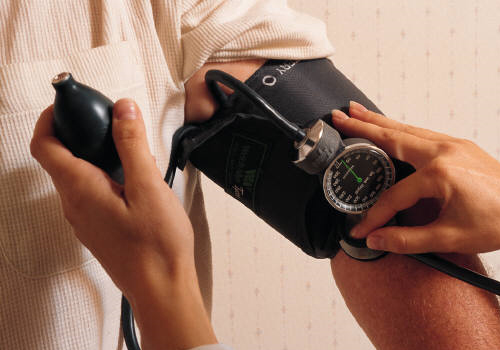Blood pressure is the force exerted by the blood on the walls of the arteries. It varies greatly during each heartbeat. When blood is being pumped out and the arteries are expanding, blood pressure is considerably higher than it is when the heart is refilling for the next beat. For this reason your blood pressure is measured in two figures: the “systolic pressure”, when blood is being forced into the arteries from the heart, and the “diastolic pressure”, when the arteries are waiting for the next beat.
Both of these figures can vary considerably in an individual, depending on activity and emotional as well as many other factors such as infections, smoking and drugs. However, the people how are rested and relaxed, and still have a systolic pressure above 140 or a diastolic above 90 are considered to have high blood pressure, or hypertension.
Hypertension is thought to be the root cause of many of the problems that plague the heart and blood vessels. The danger of untreated high blood pressure cannot be overstated.
Who gets high blood pressure?
It is rarely found in people under 20 years of age, but by age 50 approximately one-half on the world population has hypertension in some form. Until about age 50 to 55 men are far more likely than women to have high blood pressure. Some women, however, become hypertensive during pregnancy. Women who take oral contraceptives are also likely to develop high blood pressure. Also ate risk are people who have a family history of high blood pressure, those who are overweight, smokers, and people with chronic conditions such as diabetes.
How can you tell if you have high blood pressure?
Advanced cases of hypertension may be accompanied be headaches, feeling of tension and irritability, dizziness and fatigue. Generally, the only way to recognize your high blood pressure is to have it checked regularly. A single elevated reading does not necessarily mean that you have hypertension. If your blood pressure is repeatedly above the normal range for your age, you should see a physician without delay. Take it very seriously.
Treatment of high blood pressure
Most cases of hypertension, from the mildest to the severe, can be treated effectively provided that the disorder is recognized. Treatment is often easy and inexpensive and protects against early disability or death from heart attack or stroke. While many medications help to lower high blood pressure, dietary change and improved exercise habits may control hypertension by themselves. You can reduce alcohol and tobacco, lose some weight and avoid the salt in your diet. Find out some natural method to reduce hypertension and do not hesitate to apply it.
There are also many drugs on the market to lower your blood pressure.
Dangers of high blood pressure
When you have hypertension, the muscles of the arterial walls are constricted, causing the blood vessels to become narrower and less flexible. If your condition remains untreated, the heart must pump unnaturally had to force the blood through the network of constricted arteries. There are many severe cases when the heart can fail from the added strain.
